Witches in outer space: the 'magic spark' that became tarot-crafting narrative game The Cosmic Wheel Sisterhood
How the creators of The Red Strings Club went from cyberpunk to science-fantasy.
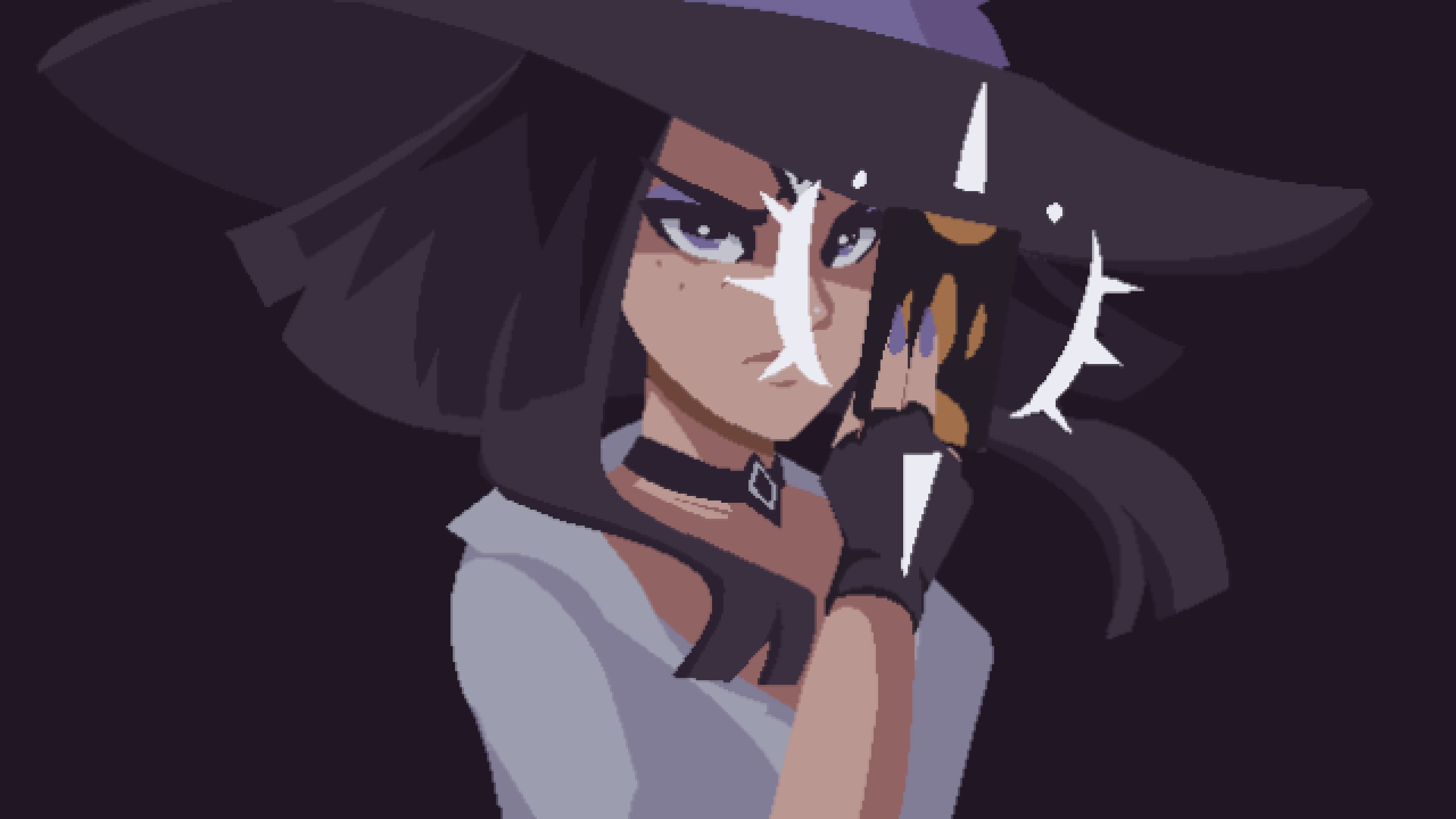
The Cosmic Wheel Sisterhood casts you as a witch living in exile who summons a terrifying behemoth, which then turns out to actually be kind of friendly and helps you design your own deck of fortune-telling cards. It's also a narrative game about navigating complicated relationships with old friends from the coven that exiled you, as well as an agent of the magical bureaucracy responsible for making sure you don't do anything buck wild like cutting a deal with a behemoth.
Also, it's set in space. Also, at one point you make pizza. There's a lot going on.
The demo for The Cosmic Wheel Sisterhood was a highlight of Steam Next Fest, one of those games you sit down to try and immediately realize is something special. That shouldn't come as a surprise since it's the work of Deconstructeam, the Spanish indie studio responsible for cyberpunk hacking/bartending/pottery game The Red Strings Club. In that and other games like Gods Will Be Watching and Essays on Empathy, Deconstructeam demonstrated a real gift at combining unusual ideas.
One of those combinations resulted in Eternal Home Floristry, a short game about an injured assassin who works as a florist while healing up. "You are a hitman that is hiding in the last natural flower shop that exists in this world," is how Deconstructeam's art director Marina González explains it. "You have to gather the flowers and make floral arrangements for different people." Players could design their own arrangements, and to Deconstructeam's surprise they got right into it. "It was nice to see people actually like that kind of thing," Marina says.
That helped lead to The Cosmic Wheel Sisterhood's equally creative card-crafting. For each card you choose a sphere, a symbol, and an arcane, which is to say a background, a foreground figure, and a bundle of thematically linked objects. The background might be a desert full of skeletal daemons, a caravan of sailing ships traversing the stars, or a comfy basement bar. Its meaning will change based on what you arrange around it, which might be a winged messenger and a collection of magic seashells, or a dominatrix fairy and a selection of drinks that make people tell the truth.
Arranging the pieces is like playing with a simple image-editing suite. You choose a slice of a larger picture to use as your backdrop, then arrange your selected elements, which can be resized, cloned, flipped, spun, and layered. Drop the wings down a layer to make them look like they're on the messenger's back, but move the envelope up a layer so you can place it on her hip. When you're done, you find out what the card means.
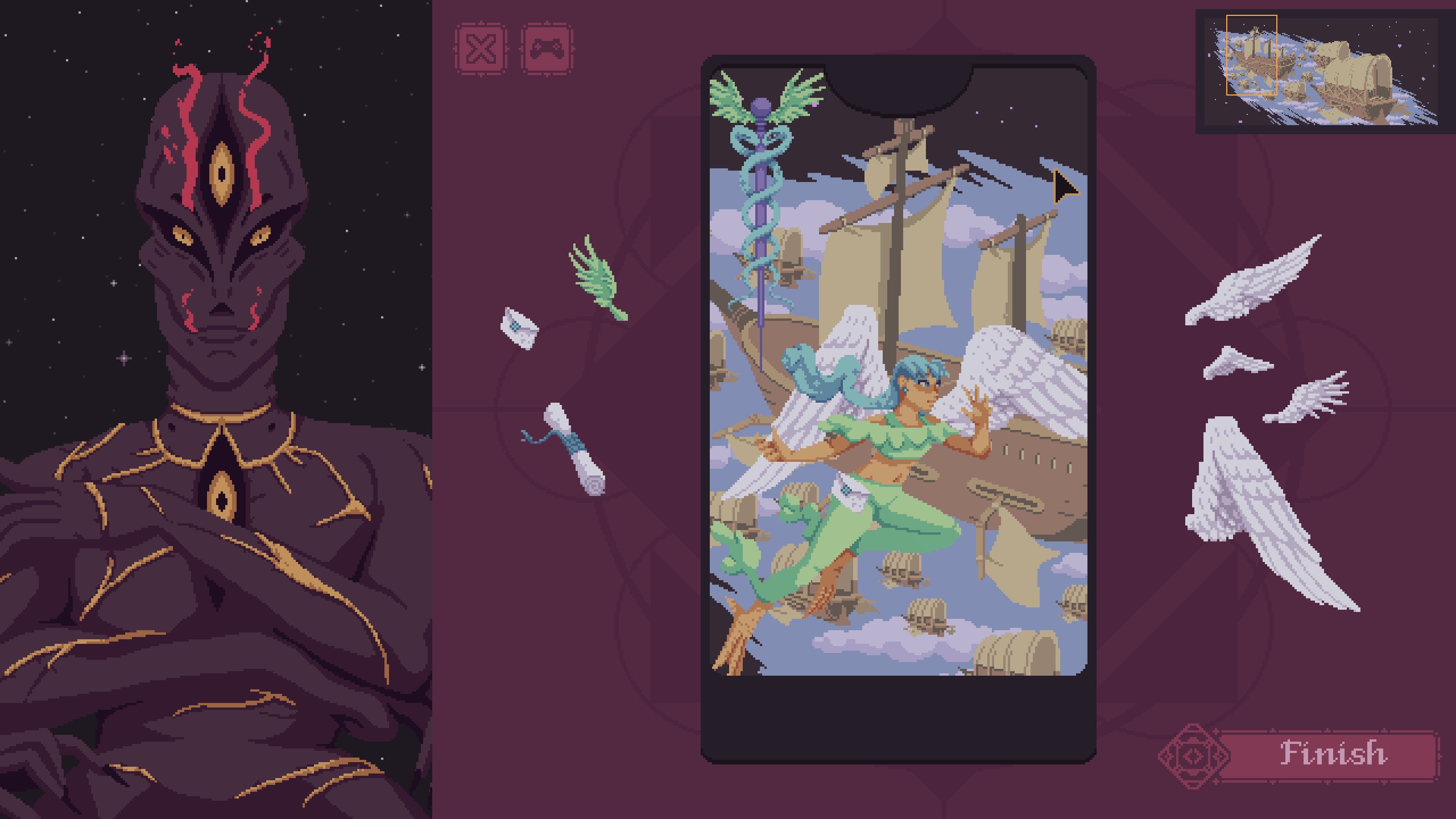
Just like in Eternal Home Floristry, this small act of personal expression helps the game feel like yours. "Including player creativity in a story improved the immersion in some way," says creative director Jordi de Paco. "Because you see your art inside, part of you is inside of the game now."
Keep up to date with the most important stories and the best deals, as picked by the PC Gamer team.
Each card reveals a bit of the setting too. The Daemonic Desertlands are described as the home of Dahlia the dagger-witch, a character you eventually meet, while the Arbiter Book is described as a tool an Arbiter can use to update a "Master Grimoire", and you just know that's going to become relevant once an Arbiter arrives to investigate the conditions of your exile.
Jordi, who wrote the lore text for the cards, says his favorite is Pilot from the Machina Cult, who is depicted inside a steel golem that's basically a magic Voltron. "It has many parts and you can build your own robot on the card," he says. "We tried to empower that kind of Arcane, and not just focus on delivering worldbuilding or the aesthetics—it had to be a nice balance with all of these elements."
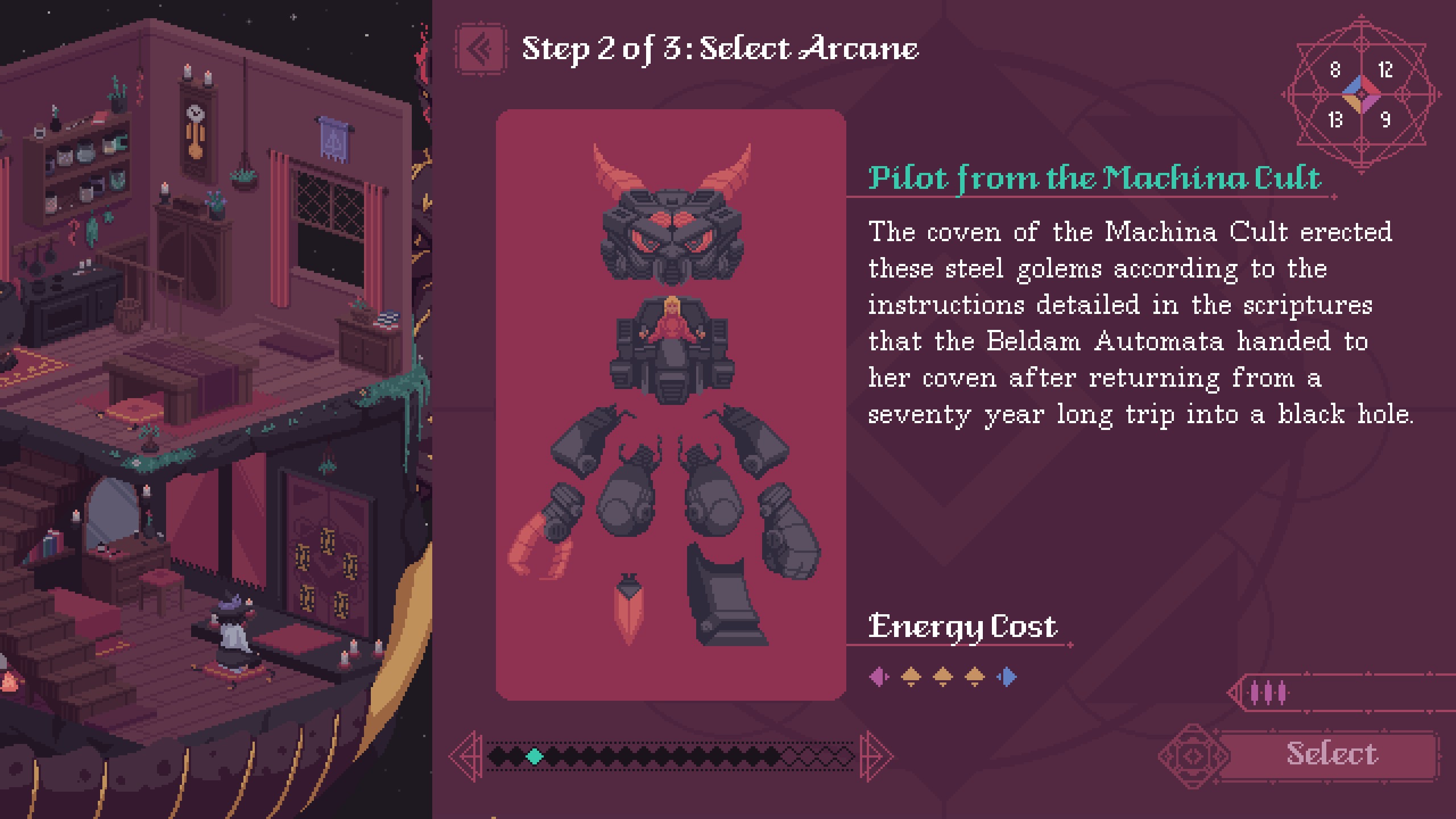
The cards then go into a deck you draw from when giving readings to The Cosmic Wheel Sisterhood's cast of witches and Arbiters. Card readings provide a structure for the first social interactions you've had in centuries, having been exiled for so long. It's a story about coming out of isolation, so I can't help but wonder if it was influenced by the pandemic.
Jordi assures me development began pre-lockdown, in 2018. The parts of The Cosmic Wheel Sisterhood that discuss how loneliness can do a number on you were created before they found out what that was like themselves. "We were talking about it before having experienced it yet," Jordi says. "Afterwards, we played and we haven't touched anything about it because it felt on point. Like, if we would have released the game earlier, it would have been like Death Stranding predicting something."
"With The Red Strings club, I remember that Jordi was super obsessed that we had to release the game as soon as possible, because the themes were relevant at that moment," says Paula Ruiz, who is responsible for music and sound at Deconstructeam. The funny thing is, The Red Strings Club's examination of AI and responsibility feels even more relevant today. "Still we are getting Steam reviews saying like, 'Oh my god, this is the world right now,'" she adds.
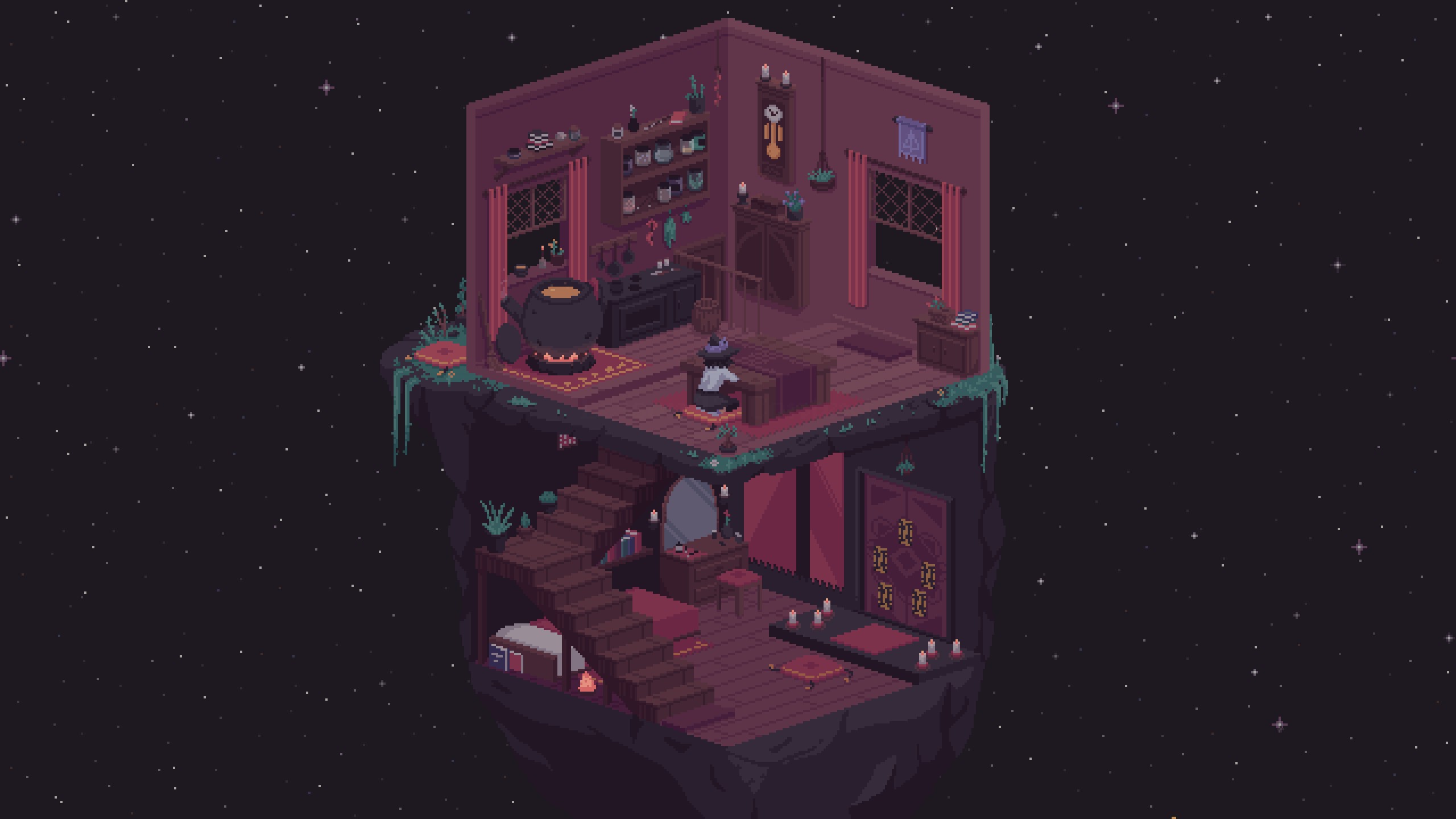
Alien Isolation
You can't get much more isolated than an asteroid floating in space, but it does make for a potentially clashing set of parts: witchcraft and ancient magic on one side, space travel and robot golems on the other. "The rest of the pieces are designed with intention," says Jordi, "but 'witches in outer space' was the magic spark. We don't know where it came from."
The loneliness of your home is emphasized by music full of sustained notes and washed-out synth, which sounds like space for some reason. Maybe because there's a lot of space between the notes? It contrasts with the different themes that accompany each character, like the drums that kick in when the behemoth arrives. "We had a lot of going back and forth trying to think what the hell does each witch actually sound like?" Paula says. "We can't say, like, 'How is this scene gonna feel?' Because that will change a lot or depending on your read, on the context of the scene."
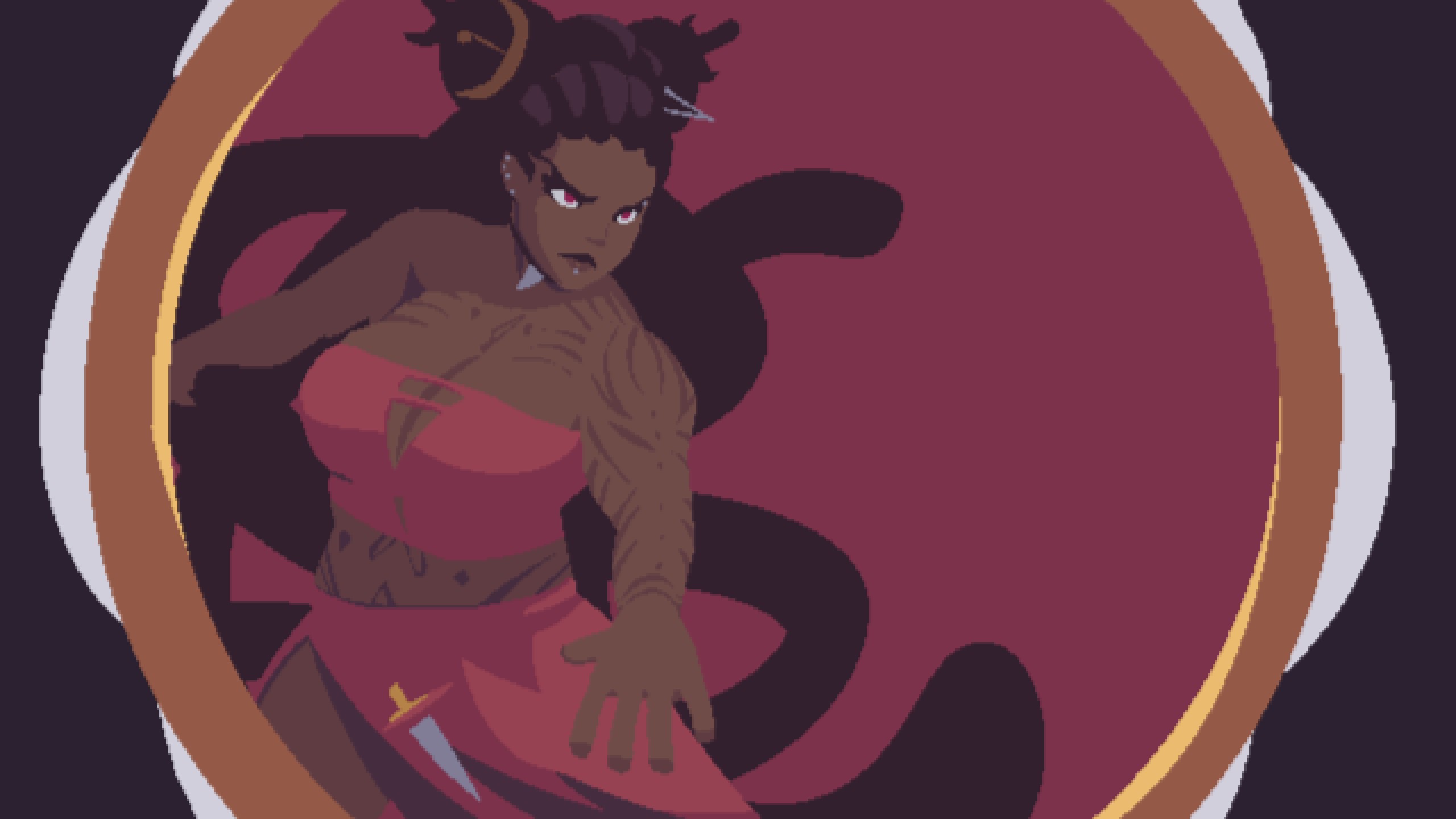
There's a vision you have near the end of the demo, which introduces many of the characters you'll meet later, accompanied by music as dramatic as any anime opening credits and a lot of fluidly animated posing. It's quite different to the sedate nature of the rest of the game up to that point, which has been about gentle conversation with a side of arts and crafts. "It's been a challenge to make this, especially with different styles of pixel art," says Marina. "Like there's the card-creation system, there's the characters with more resolution, there's Fortuna's house, and there's scenes that are more like The Red Strings Club in art style. It's been a challenge to do all of that."
It does seem more ambitious than anything Deconstructeam has created before. "In the matter of the narrative design, it's like three times The Red Strings club," says Jordi. "It's bigger, longer, with way more characters, way more storylines. It has been really hard to keep them in check and pull them into the endings of the game and stuff like that. It's been overwhelming at times, like what have we done?"
Adding to the scale is the ability to unlock more interactive parts of your home, including a library of text adventures. "We collaborated with other writers to have, like itch.io interactive fictions included as an optional minigame," Jordi says. They want to keep everyone's expectations sensible though, and the team says that, even though there is also a pizza-making minigame, I shouldn't expect some kind of WarioWare extravaganza. "Mostly it's a game about talking to witches and reading their fortunes and dealing with cosmic shenanigans," Jordi says, and that sounds like plenty to me.
The Cosmic Wheel Sisterhood will be available on Steam and GOG from August 16.

Jody's first computer was a Commodore 64, so he remembers having to use a code wheel to play Pool of Radiance. A former music journalist who interviewed everyone from Giorgio Moroder to Trent Reznor, Jody also co-hosted Australia's first radio show about videogames, Zed Games. He's written for Rock Paper Shotgun, The Big Issue, GamesRadar, Zam, Glixel, Five Out of Ten Magazine, and Playboy.com, whose cheques with the bunny logo made for fun conversations at the bank. Jody's first article for PC Gamer was about the audio of Alien Isolation, published in 2015, and since then he's written about why Silent Hill belongs on PC, why Recettear: An Item Shop's Tale is the best fantasy shopkeeper tycoon game, and how weird Lost Ark can get. Jody edited PC Gamer Indie from 2017 to 2018, and he eventually lived up to his promise to play every Warhammer videogame.

